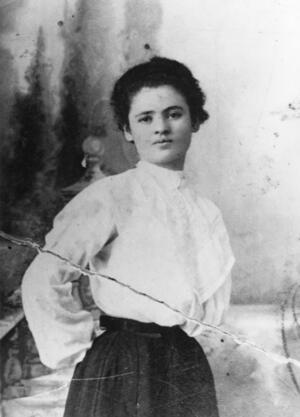Activist Clara Shavelson leads butcher shop boycott
On May 27, 1935, New York City women, organized as the City Action Committee Against the High Cost of Living, picketed butcher shops to demand a reduction in the price of meat. Convinced that wholesalers were withholding meat from the market in order to drive up prices, these wives and mothers determined not to buy meat until the price fell by ten cents per pound.
Although it echoed the kosher meat boycotts from the early years of the twentieth century, this boycott, led by veteran organizer Clara Shavelson, crossed religious and racial lines. It was the result of rare cooperation between the Communist-led United Council of Working-Class Women (UCWW) and non-Communist women's groups including neighborhood mother's clubs, church groups, and Black women's groups.
At a spring meeting convened by the UCWW, delegates from all of these groups had created a national network to address the high cost of living. Their first action was the New York City meat boycott. Begun in Brighton Beach and Coney Island, the picket lines had reached Manhattan by May 27. Five days into the boycott, the Retail Kosher Meat Trade Code Authority estimated that two-thirds of New York's kosher meat shops were closed or doing no business as a result of the women's action. Though kosher butchers were the main target of the strike, women also picketed non-kosher butchers in Harlem.
By mid-June, the strike had succeeded, as over a thousand shops reduced meat prices. But success in New York was not the end of the story. By the end of the summer, women had boycotted meat in Detroit, Chicago, Philadelphia, St. Louis, Indianapolis, Denver, Miami, and elsewhere. Outside of New York, where it had been limited to Jews and African-Americans, the strike also was taken up by more diverse groups of women. Significantly, the strike also led to new tactics. For the first time, housewives' groups traveled to Washington, D.C., to lobby federal officials. In July, Shavelson led a group of housewives to meet with Secretary of Agriculture Henry Wallace; the women demanded that he force wholesalers to stop withholding meat from the market. Although Wallace denied any federal responsibility for the high prices, blaming a drought instead, a new stage in working-class and consumer women's activism had been born.
Sources: New York Times, May 28, 1935; May 29, 1935; June 1, 1935; Annelise Orleck, Common Sense and a Little Fire (Chapel Hill, 1995).



